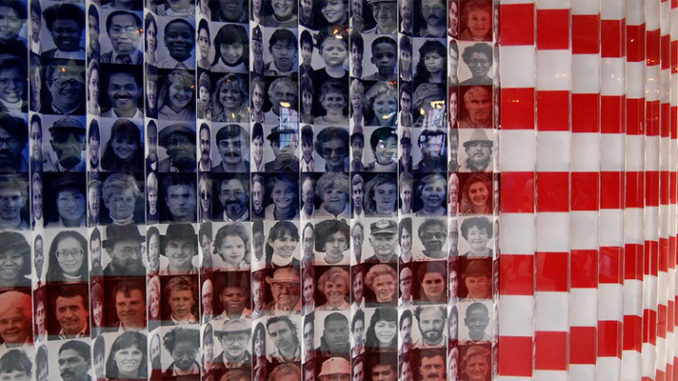
by Bret Stephens, New York Times
I prefer the window seat.
I like to idle away time on flights trying to guess where and what I’m flying over, without the benefit of the map. I’m hypnotized by the red-beige-brown carpet of California desert; mesmerized by the unbroken wilderness of northern Maine; awed by the peaks and valleys of the Cascades; calmed by the serenity of the Great Lakes.
And I draw a political conclusion: America is vast, largely empty and often lonely. Roughly 80 percent of Americans live in urban areas, covering just 3 percent of the overall landmass. We have a population density of 35 people per square kilometer — as opposed to 212 for Switzerland and 271 for the U.K.
We could use some more people. Make that a lot more.
That’s a point worth bearing in mind in the larger immigration debate unfolding in Congress. The Trump administration’s policy of forcibly separating migrant Latin American children from their parents was a moral outrage that, had it not been belatedly terminated on Wednesday, would have taken its place in the annals of American ignominy.
It was also a moral outrage that concealed a political folly. As of this writing, House Republicans are flailing in their efforts to pass a comprehensive immigration bill. That’s just as well since, as the Cato Institute’s David Bier points out, even the more moderate of the two G.O.P. bills would have cut overall legal immigration.
But that means we still need real immigration reform, and not simply as an act of decency toward so-called Dreamers brought to this country as children by their undocumented parents. America’s immigration crisis right now is that we don’t have enough immigrants.
Consider some facts.
First: The U.S. fertility rate has fallen to a record low. In May, The Times reported that women “had nearly 500,000 fewer babies than in 2007, despite the fact that there were an estimated 7 percent more women in their prime childbearing years.” That’s a harbinger of long-term, Japanese-style economic decline.
Second: Americans are getting older. In 2010 there were more than 40 million Americans over the age of 65. By 2050 the number will be closer to 90 million, or an estimated 22.1 percent of the population. That won’t be as catastrophic as Japan, where 40.1 percent of people will be over 65. But remember: We’ve only avoided Japan’s demographic fate so far by resisting its longstanding anti-immigration policies.
Third: The Federal Reserve has reported labor shortages in multiple industries throughout the country. That inhibits business growth. Nor are the shortages only a matter of missing “skills”: The New American Economy think tank estimates that the number of farm workers fell by 20 percent between 2002 and 2014, accounting for $3 billion a year in revenue losses.
Fourth: Much of rural or small-town America is emptying out. In hundreds of rural counties, more people are dying than are being born, according to the Department of Agriculture. The same Trumpian conservatives who claim to want to save the American heartland from the fabled Latin American Horde are guaranteeing conditions that over time will turn the heartland into a wasteland.
Fifth: The immigrant share (including the undocumented) of the U.S. population is not especially large: About 13.5 percent, high by recent history but below its late 19th century peak of 14.8 percent. In Israel, the share is 22.6 percent; in Australia, 27.7 percent, according to OECD data, another indicator of the powerful correlation between high levels of immigration and sustained economic dynamism.
Finally, immigrants — legal or otherwise — make better citizens than native-born Americans. More entrepreneurial. More church-going. Less likely to have kids out of wedlock. Far less likely to commit crime. These are the kind of attributes Republicans claim to admire.
Or at least they used to, before they became the party of Trump — of his nativism, demagoguery, and penchant for capricious cruelty. It was nice to hear Republican legislators decry the family separation policy. But there’s no sugarcoating the fact that a plurality of Republicans, 46 percent, favored it, while only 32 percent were opposed, according to an Ipsos poll commissioned by the Daily Beast.
This isn’t a party that’s merely losing its policy bearings. It’s one that’s losing its moral sense. If anti-Semitism is the socialism of fools, then opposition to immigration is the conservatism of morons. It mistakes identity for virtue, entitlement for merit, geographic place for moral value. In a nation of immigrants, it’s un-American.
I’ll be accused of wanting open borders. Subtract terrorists, criminals, violent fanatics and political extremists from the mix, and I plead guilty to wanting more-open borders. Come on in. There’s more than enough room in this broad and fruitful land of the free.
